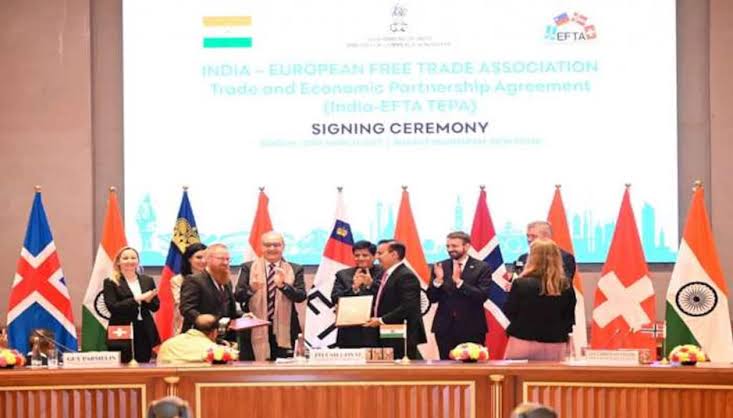India has entered into a free trade agreement (FTA) with a consortium of four European nations that do not belong to the European Union.

Table of Contents
European Free Trade Association (EFTA): India And Four European Nations Finalize A Free Trade Agreement Worth $100 Billion
India’s trade landscape is set for a significant transformation with the recent agreement struck with the European Free Trade Association (EFTA), comprising Norway, Switzerland, Iceland, and Liechtenstein. According to the country’s trade minister, this deal is poised to usher in investments totaling $100 billion (£77.8 billion).
The announcement comes amid ongoing negotiations between the United Kingdom and India regarding a Free Trade Agreement (FTA) spanning the last two years. Prime Minister Narendra Modi hailed the agreement with EFTA as a “landmark pact,” emphasizing its role in fostering economic progress and creating opportunities for the youth. Modi expressed optimism about future prosperity and mutual growth as the ties between India and EFTA nations strengthen.
Investments Over A 15-year Period
This groundbreaking agreement culminates nearly 16 years of negotiations, signifying a significant milestone in diplomatic and economic relations. As part of the deal, India commits to lifting the majority of import tariffs on industrial goods from the EFTA nations. In return, these countries are expected to make investments over a 15-year period, spanning diverse sectors such as pharmaceuticals, machinery, and manufacturing.
The EFTA issued a statement highlighting that the agreement aims to enhance market access and simplify customs procedures, facilitating the expansion of Indian and EFTA businesses in their respective markets.
While the deal awaits ratification from India and the four EFTA nations, Switzerland has announced plans to complete this process by the coming year. The timing aligns with India’s upcoming general elections, where Prime Minister Modi seeks a record third term in office.
Over the past two years, India has been actively engaging in trade agreements, securing deals with Australia and the United Arab Emirates. Amid these developments, the UK’s trade minister, Kemi Badenoch, raised the possibility of a pre-election free trade deal between Britain and India, acknowledging the challenges ahead. However, she refrained from setting any firm deadlines tied to the election, recognizing the complexity of the negotiation process.


